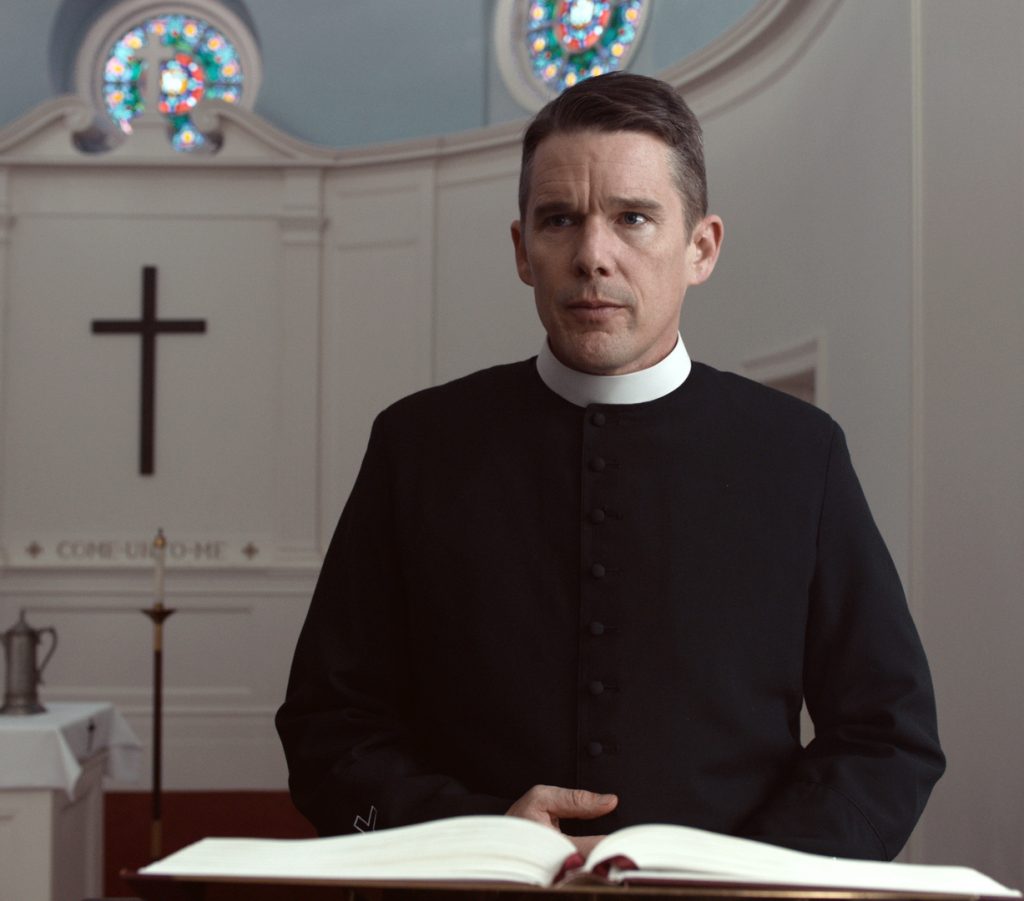In Mel Gibson’s “The Passion of the Christ,” the criminal Barabbas is portrayed as a deranged, nearly subhuman figure. Who would choose him over the handsome Jesus Christ, played by Jim Caviezel? In reality, Barabbas was a freedom fighter, a proud warrior who sought to deliver Palestine from Roman oppression.
Throughout the centuries, the choice of Jesus or Barabbas became symbolic of two opposing approaches to religion and social justice. Should the Church be primarily concerned with righting the wrongs of the world, as Barabbas did, or should it be primarily occupied with spiritual goods, such as loving the enemy?
That’s one of the pivotal questions that Paul Schrader’s latest film, “First Reformed,” explores through beautiful, austere cinematography, convincing performances and a dramatic plot twist. But it does it in a remarkably pessimistic way that shows us what Christianity without God can look like.
Rev. Toller (Ethan Hawke) is the troubled pastor of a church that is 250 years old and has virtually no attendance. The big crowds go to Abundant Life, a modern megachurch guided by Pastor Jeffers (played by Cedric the Entertainer), who also happens to be Toller’s friend and spiritual guide.
Mary (Amanda Seyfried) asks him to talk to her husband Michael (Philip Ettinger), who wants her to have an abortion. An environmental activist, Michael does not want to let a child into a world facing the impending ecological apocalypse.
Toller is unable to understand that the man is seriously concerned about something that is happening outside of himself. In another scene, the reverend is talking to a group of youths about God and justice. One of the kids interrupts him: “Jesus did not turn the other cheek,” he yells.
The youths are eager to fight to change the world. The church, which seems only able to offer some lukewarm spiritual common sense, is clearly not up to meeting their needs.
The whole movie revolves around the celebration of 250 years of life of Toller’s church (First Reformed). Churchmen are busy commemorating an empty and useless mausoleum, while our common home, the earth, goes to waste.
Mary’s husband, who goes so far as to compare himself to a martyr, is ready to die for his idea and the common good. Is he more religious than they are?
But the issues at stake are more profound and complex than just the question about the role of the church. In one of Toller’s meditations, we hear that all human occupations are empty, until they are filled by God. But does God fill the void in the reverend’s life?
In Toller’s case, it would not seem so. As the movie goes on, Toller becomes increasingly involved with Michael’s environmentalist agenda.
Throughout the film, another central question resonates: Will God ever forgive us?
In an interview last month with Rolling Stone, Schrader gave this answer: “Of course he will, we made him. That’s his job description! We will make you, God, but you have to forgive us.”
Like Schrader’s, Toller’s god is reduced to a mere concept. Man projects his despair into the cosmos, and the voice that returns to him from outer space is just the magnified echo of his anxieties.
As Pope Benedict XVI notes in the encyclical “Spe Salvi” (“Saved in Hope”), modern atheism is essentially born out of a demand for justice. And in the absence of God, it is up to men to make things right.
In the movie, Toller does not lose his faith. Rather, he himself rises to the role of god. In the same interview, Schrader praised a book titled “Homo Deus” (“Man-God”) by Israeli intellectual Yuval Noah Harari.
Toller, however, seeks not to be the merciful god of Christianity, but the seemingly merciless god of the Old Testament, one who destroys his enemies.
The movie’s final twist suggests that love can fill the void Toller tries so hard to fill. But it is a private form of redemption, hardly enough to provide a satisfying answer to the devastating questions posed by the film.
“You are always in Gethsemane!” Jeffers tells Toller at one point in the film, accusing him of always agonizing about the most profound questions and taking things so seriously.
But that’s what “First Reformed” does: it puts its audience into Gethsemane together with its protagonist. It asks difficult questions and constantly steers clear of the kind of superficial ready-made answers one would get from the likes of Jeffers. And this movie probes a spiritual depth rarely explored in most Hollywood productions. This is what great art is about.
To remain in Gethsemane is the reality of a church that has lost sight of God. The message of Christianity is, thankfully, more optimistic. As Pope Francis points out in his encyclical on care for our common home, “Laudato Si,” the risen Christ can really fill this void in mankind’s hearts, filling it even to the point of convincing us to care about the environment.
Stefano Rebeggiani is an assistant professor of Classics at the University of Southern California. He lives in Los Angeles with his wife and two children.

